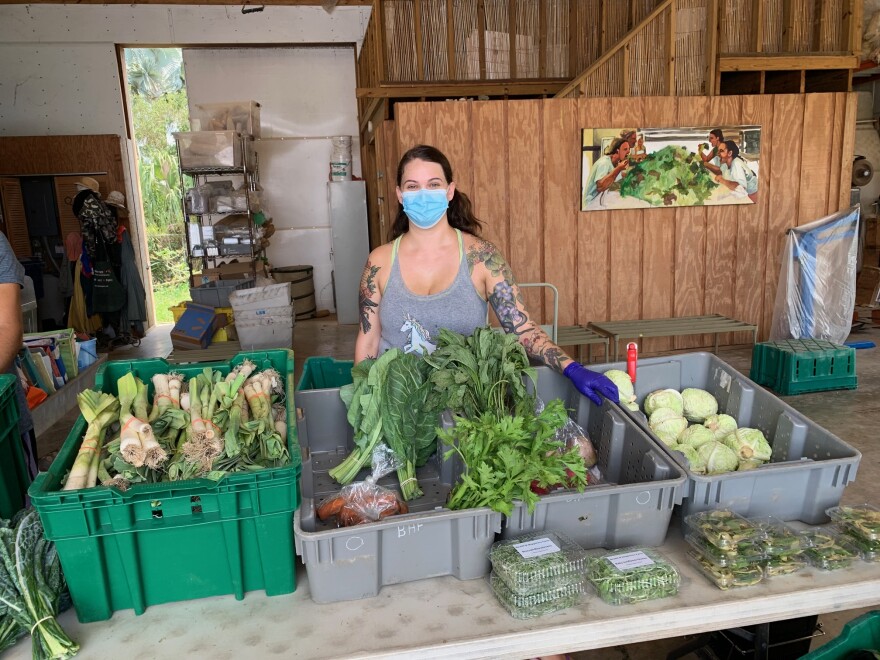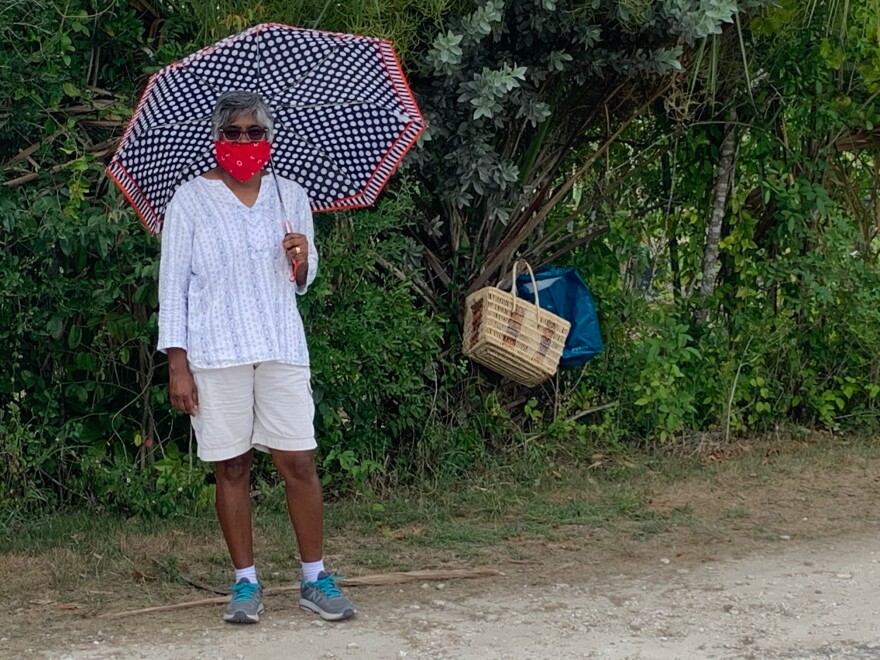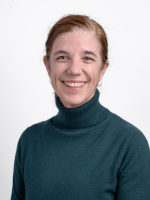On a sweltering Friday afternoon last month, Margie Pikarsky stood under a tent near her barn in the Redland, ringing up a customer.
The purchase of kale, squash and bunches of sunflowers was anything but ordinary as COVID-19 spread across South Florida and shut down businesses. An X on the barn floor marked the spot where a single customer was allowed to enter. Masks shrouded buyers and sellers.
WLRN is committed to providing the trusted news and local reporting you rely on. Please keep WLRN strong with your support today. Donate now. Thank you.
When a customer reached for a jar of honey, Pikarsky’s daughter cut her off.
“I’ll touch it,” Rachel Pikarsky said. “I know. It's so weird. It's a whole new world.”
The shut down that slammed restaurants, hotels, malls and every other kind of business that involved human contact took a particularly hard swipe at farmers in South Florida.

Some, like Pikarsky's Bee Heaven Farm, mostly distributed their harvests through farmers markets, subscription services and a small local network that ebbed and flowed over the years, saw a big bump. Coronavirus-wary buyers wanted to know where their produce came from — and fewer hands touching it. The direct farm sales suddenly caught their attention.
For bigger operations, the pandemic was a disaster. Faced with harvesting produce they couldn’t sell, farmers instead plowed them under to save cost.
Sam Accursio, a second-generation farmer in Homestead, tried donating produce to local food banks when contracts dried up. But even with long lines at the banks, he had too much produce. The banks just weren’t equipped to handle the volume from a large-scale farm.
“So we chopped up 70 percent of our crop and left it in the field,” he said.
As the pandemic steams on, buyers and farmers are gaining a new appreciation for locally-grown and sold produce in a way that may reshape the South Florida farming community for years to come.
“The way people are going to buy food and do almost everything else is going to change dramatically as a result of this,” said Steven Green, an organic farmer who supplies Pikarsky. “The way we get our food is only one small picture of the giant picture of the way we live our lives.”

Every winter, Accursio & Sons grows winter produce on thousands of acres in South Dade. In normal times, the vast bulk of that produce is shipped to restaurants in New York and New Jersey. But when restaurants across the country shut down, the supply chain that Accursio relies on ground to a halt.
“We started seeing all of our food service items start backing up immediately because that’s where they all went,” he said.
At first, he donated large amounts of the produce to local food banks. But since the banks couldn’t handle it, he literally had tons of food with nowhere to sell it. And then he had an idea. He would keep harvesting the remaining 30 percent of his crop and sell it directly to the public out of his Homestead headquarters. Boxes packed to the brim with tomatoes, zucchini, okra, cucumbers and green beans were sold at $10 a pop.
“We had, I would say, thousands of people come through this facility and take a lot of wholesale cheap produce,” Accursio said. “It basically worked out to the buyer at 50 cents a pound.”
Long lines of cars started lining up to get produce before dawn. The Homestead Police Department was called to maintain order.
“It’s a win-win. The farmer is at least getting some of his cost back. But the consumer is getting produce that is so fresh and so cheap,” he said. “They are eating produce that was picked yesterday. And they’re eating it today and they’re like — oh my goodness squash tastes this good? Not realizing a lot of the squash that they’re eating right here in Dade County is trucked 1,500 miles from Mexico and by the time they put it in their mouth, it could be ten days old.”
The local sales don’t completely make up for his loss in revenue from restaurant customers. But it’s been enough of a success that he said he is looking to incorporate direct-to-consumer sales into all of next year’s growing seasons.
The breakdown of national and international supply lines have forced a broad reevaluation in the wisdom of business as usual, in a globalized economy.

Case in point: a pilot program developed in the middle of the pandemic by the Florida Department of Corrections. The program supplies local produce to over 80,000 inmates in state prisons, in an effort to help struggling local farmers while giving inmates fresher food.
Much of the produce now being bought from Florida farms — things like lettuce, squash and green beans — was previously shipped from California, according to state contract records. Florida produce is cheaper. The Florida Department of Agriculture estimates the pilot program has already saved taxpayers about $25,000 in just a few weeks.
“It’s almost shocking that we haven’t done this earlier,” said Jenn Bynoe, a consultant who worked with the Dade County Farm Bureau to set up the program. “Things kind of coming to a screeching stop gave us the ability for us to really investigate and kind of peer into how does this system truly work for our farmers, and truly work for our consumers.”
"We don't want to be reactive ever again," said Tyra Phillips, the executive director of the Dade County Farm Bureau.
The early success of the "Farm-to-Inmate" program led Florida Agriculture Commissioner Nikki Fried to come up with a plan submitted to Gov. Ron DeSantis’ Re-Open Florida Task Force, calling for an expansion of such programs.
“Whether that’s in our nursing homes, hospitals, or other agencies, we want to see where other types of contracts can be created,” said Fried. “Why are we not making sure that all the produce that’s being used by those agencies — that those dollars are not coming back to our state by purchasing local produce?”

The agriculture department also created a website connecting residents to farms like the one run by Accursio -- farms that sell local produce at cheaper-than-store rates. The website has so far clocked more than half a million visits, said Fried. It’s part of what Fried hopes will be a permanent change brought on by the crisis.
“I keep calling this a consumer conscious awakening that’s happening here in the state of Florida. So many more of our consumers and our citizens are understanding the connections between our farmers and the economy,” said Fried. “You’re going to start seeing some of those changes to human behavior even after COVID — which I’m saying, is almost a silver lining of all of this.”
It’s certainly been a silver lining for Pikarsky, a pioneer in the community of small farmers.
A University of Miami math major, she started farming part-time in the Redland in 1992, tending to a five-acre avocado grove while she worked in UM’s IT department. In the early 2000s, she quit to farm full-time and built her business on a new model for small farmers called Community Supported Agriculture, or CSAs.
CSAs allowed small farmers to avoid bank loans by setting up a subscription service for buyers. Buyers purchase shares of harvests at the start of the season. Then pick up boxes packed with whatever is picked that week.
“Traditional farming, you go and borrow money from the bank to buy your fertilizer, buy your seeds, hire your people, plant your crops. And then months later, when you start harvesting your crop, the money you make from that is what you use to pay back those loans,” she said. “If you do really well, sure, you can make all kinds of money. But it seems like you're always having to go in this cycle where you have to borrow money from the bank and then repay it."
But participating in a CSA can require patience. Buyers only get that week’s harvest, and eating kale for a week may not be for everyone.
“Boxes might be skimpy for a few weeks, or skimpier. And then other times the boxes might be so full they’re just stuffed to the gills,” Pikarsky said. “One year we had these cabbages that were so huge we couldn't even put them in the boxes.”

Pikarsky’s CSA started with about 40 buyers and 12 growers. Business eventually grew, topping out at 500, she said.
“At the height of our operation, we had pickup sites in Broward County [and] seven or eight pickup sites in Dade County,” she said. “We had one all the way down in Key West.”
But in recent years, the number dropped as farmers markets boomed and farm-to-table restaurants flourished. Then came the coronavirus and shoppers either anxious about supermarkets or fearful of short supplies started calling. Within a week, shares in her CSA more than doubled.
“All of a sudden these people have finally, they've woken up again to what we knew before, to where we were 20 years ago,” she said.
But it may have come too late for this season. A streak of hot weather crashed crops, she said. That’s left behind summer crops, which may not suit everyone’s taste: okra, long beans, bitter melon or malanga.
“There's no tomatoes. No cucumbers,” she said. “There's no squash. There's no lettuce.”
Just the oddball stuff. But luckily for Pikarsky, it’s the kind of farming she relishes and has made her mission to convince others to consume.
“I grow a lot of unusual and weird things to introduce them to these edible things and tropical things,” she said. “There's this whole permaculture movement, which is basically something that people have been doing forever.”
An earlier version of this story misidentified Pikarsky's farm. It is Bee Heaven.







